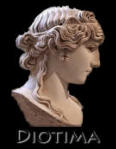|
click on links for more information and
check out the supplement page
for more background.
Cherries
by Lucien Stryk
Because
I sit eating
cherries
which I did not
pick
a girl
goes bad under
the elevator tracks,
will
never be whole again.
Because I want the full bag,
grasping, twenty-five
children
cry for food. Gorging,
I’ve none to offer. I want
to care,
I mean to, but
not
yet, a dozen cherries
rattling at the bottom of my bag.
One by one I lift them to
my mouth, slowly break
their skin—twelve nations
bleed. Because I love,
because
I need cherries, I
cannot help them. My happiness,
bought cheap,
must last forever.
2. "I" - Look at how often the
speakers uses “I” in this short poem. What does that mean?
3. "PICK" - Why is it
significant that he didn’t pick the cherries. How many of us
do pick our own cherries?
4. "GOES BAD" - What does it
mean to “go bad” when referring to fruit and when referring
to people?
5. "ELEVATOR TRACKS" - Stryk
lived in Chicago whose transit system includes an elevated
train. The “elevator tracks” might be referring to the
sections of the train that are elevated.
6. "GRASPING" - Who is grasping?
The narrator? The children? Both? Note the difference in why
each are grasping.
7. "I MEAN TO" - By saying he
wants and means to care, what does that tell us about his
state of enlightenment, of his awareness of what’s going on
in the world? Does this make his actions even more
reprehensible? How is he reflective of the average
experience/existence of people in America?
8. "BUT NOT YET" - After this
phrase, he mentions the cherries left at the bottom of the
bag. Does that mean he won’t care until he has nothing to
give? Will that provide him with an excuse not to care – “I
would give, but I have nothing myself” kind of thinking?
9. "BLEED" - What happens when
we bite into or cut up cherries? How is this connected to
bleeding?
10. "I NEED CHERRIES" - He
doesn’t just “love” cherries – he “needs” them. What is the
difference in the two feelings? And what do these cherries
potentially represent in America?
11. "MY HAPPINESS BOUGHT CHEAP"
- Why is it “bought cheap”?
12. "MUST LAST FOREVER" - What
kind of life view seeks eternal happiness? How realistic is
this?
|

